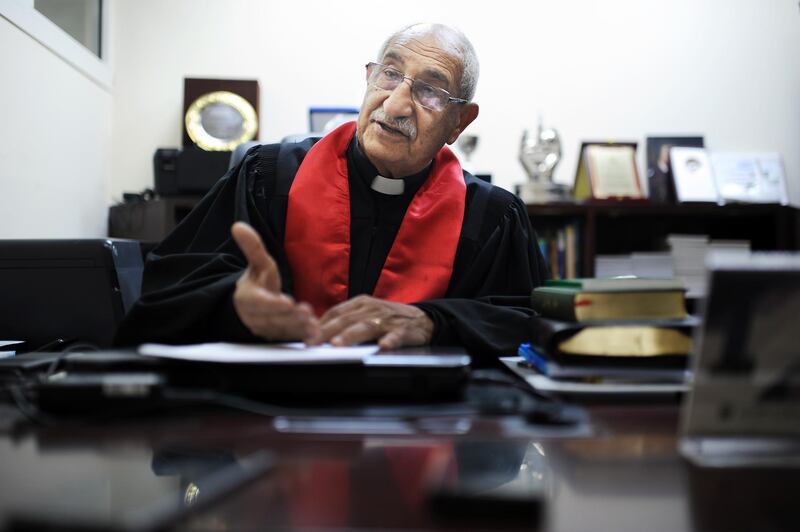The Abu Dhabi justice system has signed an agreement with Christian clergy that paves the way for churches to approve marriages, mediate divorces and soon handle child custody.
In what was described as an unprecedented move, the process will lead to family and personal court matters being dealt with outside the sharia-based system, should those involved so choose.
Ministers and priests will work closely with Abu Dhabi Judicial Department with the intention of handling such cases from next year. Church officials on Thursday said it is also intended that wills could be made out with the involvement of the church, rather than the courts.
As The National first reported in the summer, the change in the law is part of a broader legal review by Sheikh Mansour bin Zayed, Deputy Prime Minister and Minister of Presidential Affairs.
The intention is to ensure non-Muslims have the option to use a system that is not based on the sharia system, and the unexpected complications that can bring to those unfamiliar with the process.
Bishoy Fakhri, pastor of St Antony Coptic Orthodox Cathedral in Abu Dhabi, said that "giving the church the authority to be part of the entire justice system is an exemplary and unique experience".
Rev Fakhri and Rev Joseph Faragalla, head of the Abu Dhabi Arabic Evangelical Church, signed the agreement with the Abu Dhabi Judicial Department on Thursday. Rev Faragella signed on behalf of all Evangelical churches in the capital.
“According to the agreement, we the Church will be working on two main areas concerning family matters; we will assist couples with disputes and offer mediation sessions.”
____________
Read more
[ Non-Muslim couples to be able to marry and divorce through churches in UAE ]
[ Explained: divorce in Abu Dhabi ]
[ High cost of separation is emotional and financial for Abu Dhabi divorcee ]
[ New Abu Dhabi divorce and mediation system could mean an end to hefty legal fees ]
____________
Agreements drawn up during these sessions will be legally binding and, for the first time, recognised by the court.
“We will also be involved with wills and inheritance, where we will give non-Muslims the option to have their wills and inheritance distributed according to their choice, sharia or their country’s law.”
This is still under process and non-Muslims wishing to register a will take a different route.
"To go to this extent for non-Muslims just shows how tolerant this country is, and it is going to great lengths to make non-Muslims as comfortable as possible," Rev Faragalla said. At present, anyone wishing to divorce their husband or wife in Abu Dhabi would have to go through mandatory mediation sessions with court counsellors, often conducted in Arabic with translators present.
This would no longer be necessary under the new system.
The churches were clear that they did not wish to make divorce easier, but would instead use the mediation process to help couples to reconcile.
When it comes to wills, taking the process away from the court system would also ensure that sharia would not apply.
Under sharia, in the event of someone's death, all assets are typically frozen while members of the extended family are contacted to determine if they have a claim. This can leave surviving family members with no access to funds or assets for a lengthy period of time.
Rev Faragalla said that his church welcomes non-Muslims regardless of their denomination. He said those seeking a divorce, for example, would soon go through mandatory mediation by the church and "if they are at their wits' end, and there is no way but divorce, then the church will grant them a divorce and register it at ADJD".
He said this would provide relief for those granted a divorce by the Abu Dhabi authorities that is not recognised by some churches.
Hesham Elrafei, a legal advisor to ADJD, said the latest agreement was about “establishing an alternative dispute resolution mechanism for non-Muslim family disputes in Abu Dhabi that takes into account the parties’ choice to appoint the church for the mediation, reconciliation and arbitration of their family disputes, in a private and confidential manner without the need to visit the court”.
Until now, he said, “there was no clear mechanism for non-Muslims to choose an alternative route to sharia courts”. He said in many cases, having a church official that the couple knows would bring a better result for all involved.
“He is close to them and to their problems, which makes him more competent to settle their disputes than the normal mediator of the court,” Mr Elrafei said. He also said the “current family reconciliation system is not efficient for expats and non-Muslims, as the difference of language and culture is a barrier between the mediator and the couples”.
"Once the settlement agreement is issued by the church, the church will liaise with the court to stamp it and give it enforcement power. This is an easy, hassle-free process, quick and cost effective.
"Prioritising the parties' choice and respecting their faith and privacy is the aim."






